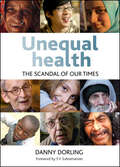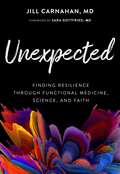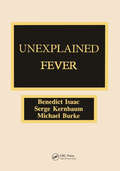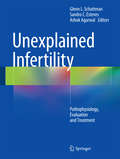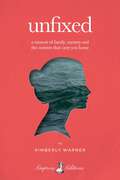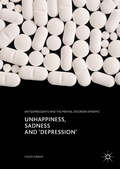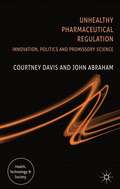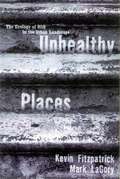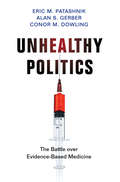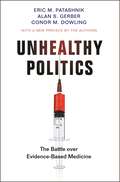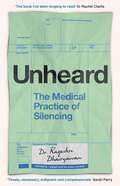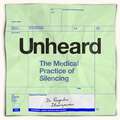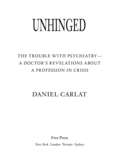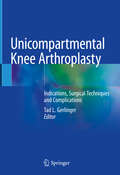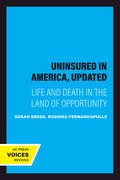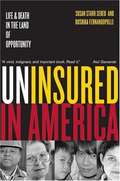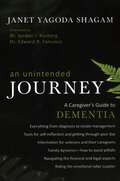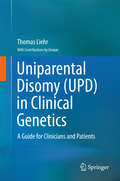- Table View
- List View
Unequal Health: The Scandal of Our Times
by Danny DorlingHealth inequalities are the most important inequalities of all. In the US and the UK these inequalities have now reached an extent not seen for over a century. Most people's health is much better now than then, but the gaps in life expectancy between regions, between cities, and between neighbourhoods within cities now surpass the worst measures over the last hundred years. In almost all other affluent countries, inequalities in health are lower and people live longer. In his new book, academic and writer Danny Dorling describes the current extent of inequalities in health as the scandal of our times. He provides nine new chapters and updates a wide selection of his highly influential writings on health, including international-peer reviewed studies, annotated lectures, newspaper articles, and interview transcripts, to create an accessible collection that is both contemporary and authoritative. As a whole the book shows conclusively that inequalities in health are the scandal of our times in the most unequal of rich nations and calls for immediate action to reduce these inequalities in the near future.
Unexpected: Finding Resilience through Functional Medicine, Science, and Faith
by Dr. Jill CarnahanIn Unexpected, Dr. Jill Carnahan shares her story of facing life-altering illness, fighting for her health, and overcoming sickness using both science and faith so that others can learn to live their own transformative stories. There are times in each of our lives when change and uncertainty threaten to disrupt everything we thought was true. It may occur after a diagnosis of a life-threatening illness, the loss of a job, the death of a loved one, or another unexpected circumstance that threatens our health, safety or security. Written as our world is changing at an exponential rate, Dr. Jill Carnahan&’s riveting and compassionate exploration of healing through Functional Medicine introduces a new paradigm for readers where darkness and fear are replaced with hope, resilience, profound healing, unconditional love, and unexpected miracles. Each chapter reveals practical advice that can be readily used for conditions like mold toxicity, cancer, autoimmune conditions, Lyme disease, and more. Dr. Jill&’s raw and honest account of her own challenges facing life-threatening illness, living with autoimmunity and mold toxicity, trying to save a failed marriage, and the harsh realities of working in a medical system that has no tolerance for stepping outside the lines, reveals a new path of empowerment for taking control of our own health and wellbeing. For the skeptic or the faithful, Unexpected is a valuable guide for living an extraordinary life of love and resilience.
Unexplained Fever
by Michael J. Burke Benedict Isaac Serge KernbaumThis book covers pathophysiology of fever, the general approach to the febrile patient, and offers a systematic, in-depth discussion regarding the differential diagnosis of unexplained fever. The authors define an unexplained fever as a fever which lasts a minimum of 14 days and whose etiology is not known. This one-of-a-kind publication highlights the main causes of fever, specifically infectious diseases, cancer, connective tissue diseases, various rare disorders, plus etiologies which are often ignored. Also, laboratory and medical imaging techniques for diagnosing fevers are included. Written in a comprehensive, unrepetitious style, this "must-have" resource includes such aspects as the history of the fever, a review of published cases, the approach to the patient, and an analytical review. This up-to-date volume is an indispensable guide that should be read by physicians, surgeons, internists, microbiologists and other medical professionals.
Unexplained Infertility
by Ashok Agarwal Sandro C. Esteves Glenn L. SchattmanWritten and edited by leading, internationally recognized clinicians and scientists in reproductive medicine and related fields, this unique text is a practical and comprehensive review of the clinical and scientific significance of unexplained male and female infertility and its management. The book is divided into thematic sections to ensure the most useful presentation of topics, opening with definitions and epidemiology of unexplained infertility, including discussion of the WHO's cutoff values for human semen characteristics and its ramifications. Sections covering male and female reproductive pathophysiology follow respectively, covering biological, genetic and environmental causative factors, with a subsequent section on evaluative techniques for male and female patients. Expectant, medical and surgical treatment strategies comprise the fifth section of the book, where active interventions and outcomes of each treatment modality are carefully considered. The final section discusses assisted reproductive techniques to manage unexplained infertility, such as intrauterine insemination and in vitro fertilization, as well as future perspectives. Thoughtful and enlightening, Unexplained Infertility: Pathophysiology, Evaluation and Treatment will be an invaluable resource for all clinicians and scientists working in the fields of reproductive medicine and infertility.
Unfixed: A Memoir of Family, Mystery, and the Currents That Carry You Home
by Kimberly WarnerWhen the tide of hidden truths and an unsteady body collide, one woman&’s search for home becomes a journey of reclamation, resilience, and the enduring power of forgiveness. What do you do when the foundations of your life-family, identity, and health-begin to crack beneath your feet? In Unfixed, Kimberly takes readers on an unforgettable journey through the uncharted waters of family secrets, chronic illness, and the relentless search for truth and forgiveness. When Warner's seemingly stable world begins to unravel, she discovers that her father--a figure both present and painfully absent--harbors a long-buried secret. This revelation propels her into an emotional labyrinth of discovery, forcing her to confront the ghosts of her past and redefine the meaning of home, family, and self. Set against the backdrop of Warner's battle with an elusive and debilitating illness, Unfixed is a deeply intimate exploration of resilience and vulnerability. Warner masterfully weaves together threads of personal struggle and universal themes, painting a portrait of a life in flux that will resonate with anyone who has ever sought clarity in chaos. At its heart, Unfixed is a story of reckoning--not only with the haunting specter of a lost father but also with the body's betrayal and the limits of medical certainty. With the lyricism of Dani Shapiro's Inheritance and the rich emotional depth of Where the Crawdads Sing, Warner crafts a narrative that is as gripping as it is profoundly moving. Through luminous prose and unflinching honesty, Unfixed reveals the beauty and heartbreak of uncovering truths that were never meant to be found. It is a celebration of the human spirit's capacity to adapt and thrive in the face of the unknown, offering readers a poignant reminder that even in the most unfixed of lives, there is room for hope, connection, and self-discovery.
Unfälle durch Blitzschlag: Medizinische Aspekte
by Fred ZackDas Buch stellt die relevanten medizinischen Aspekte bei einem Unfall durch Blitzschlag praxisnah und mit Fallbeispielen belegt dar: Arten der Energieübertragung, meteorologische und elektrotechnische Grundlagen, notfallmedizinische Erstversorgung sowie Überblick über die häufigsten, in der internationalen Literatur beschriebenen Folgeerkrankungen und deren Behandlung. Weitere Themen sind die Besonderheiten der ärztlichen Leichenschau bei Tod durch Blitzschlag, pathophysiologische Aspekte der Todesursache sowie Wissenswertes zur Epidemiologie. Es wendet sich an Ärzte und Ärztinnen aller Fachdisziplinen, die in die Akutversorgung oder Nachsorge von Personen nach Unfällen durch Blitzschlag eingebunden sind, z.B. aus der Notfallmedizin, Rechtsmedizin, Intensivmedizin und Allgemeinmedizin.
Unfälle durch Blitzschlag: Medizinische Aspekte
by Fred ZackDas Buch stellt die relevanten medizinischen Aspekte bei einem Unfall durch Blitzschlag praxisnah und mit Fallbeispielen belegt dar: Arten der Energieübertragung, meteorologische und elektrotechnische Grundlagen, notfallmedizinische Erstversorgung sowie Überblick über die häufigsten, in der internationalen Literatur beschriebenen Folgeerkrankungen und deren Behandlung. Weitere Themen sind die Besonderheiten der ärztlichen Leichenschau bei Tod durch Blitzschlag, pathophysiologische Aspekte der Todesursache sowie Wissenswertes zur Epidemiologie. Es wendet sich an Ärzte und Ärztinnen aller Fachdisziplinen, die in die Akutversorgung oder Nachsorge von Personen nach Unfällen durch Blitzschlag eingebunden sind, z.B. aus der Notfallmedizin, Rechtsmedizin, Intensivmedizin und Allgemeinmedizin. Die 2. Auflage erscheint überarbeitet und aktualisiert.
Ungewissheitsintoleranz und die psychischen Folgen: Behandlungsleitfaden für Psychotherapie und Beratung (Psychotherapie: Praxis)
by Nils SpitzerDieses Buch führt Psychotherapeuten und Berater in relevante Facetten von Ungewissheitsintoleranz ein, verdeutlicht ihre transdiagnostische Rolle bei psychischen Störungen und stellt detailliert therapeutische Ansatzpunkte zu ihrer Veränderung vor. Der Autor zeigt, wie Therapeuten, Berater und Psychiater ihre Patienten und Klienten dabei unterstützen können, Ungewissheit besser auszuhalten. Denn ausgeprägte Ungewissheitstoleranz ist möglicherweise eine Schlüsselkompetenz in unserer Zeit beständigen Wandels und steigender Unsicherheit.Die psychotherapeutische Forschung beschäftigt sich unter dem Begriff Intoleranz gegenüber Ungewissheit/Intolerance of Uncertainty (IU) mit den negativen Folgen für Menschen, die Ungewissheit nur in kleiner Dosis ertragen können. Die Liste der psychischen Diagnosen, mit denen IU in Zusammenhang gebracht wird, ist lang: Generalisierte Angststörung, Zwangsstörung, Soziale Phobie, andere Angststörungen, Autismus, Depression und der ungewisse Verlauf chronischer Krankheiten. Aus dem Inhalt: Ungewissheit – Geringe Toleranz gegenüber dem Ungewissen – Mögliche Ursachen – Psychische Folgen – Therapieziele – Therapeutische Beziehung – Exploration – Interventionen – Ideen zu einem alternativen Sinn für das Ungewisse. Der Autor: Nils Spitzer ist Psychologischer Psychotherapeut in freier Praxis, Dozent, Autor zahlreicher Artikel und mehrerer Fachbücher sowie Mitherausgeber der Zeitschrift für Rational-Emotive & Kognitive Verhaltenstherapie.
Unhappiness, Sadness and 'Depression'
by Tullio GiraldiThis book examines existing treatments, legislation and research methodology of depression and exposes their limitations, championing psycho-social support as an alternative. Depression, affecting 350 million people according to the World Health Organisation, is almost invariably diagnosed by the criteria of the American Psychiatric Association - a definition which encompasses those with normal emotional responses to stressful life events. Tullio Giraldi discusses recent developments in popular and academic dialogue related to the use of antidepressants and recent increases in depression diagnosis and laments the rise in prescribing antidepressants despite their links to suicide and unfulfilled promises of efficacy and safety. He argues that psychotherapy is a cost effective treatment devoid of drugs' adverse effects. This work presents psycho-social support as an alternative to antidepressants, particularly for less severe cases, and as a more effective strategy for coping with the emotional challenges of today's global reality. Patients, students of medicine and psychology, and professionals of mental health will find this work valuable.
Unhealthy Pharmaceutical Regulation
by Courtney Davis John AbrahamEuropean and American drug regulators govern a multi-billion-dollar pharmaceutical industry selling its products on the world's two largest medicines markets. This is the first book to investigate how effectively American and supranational EU governments have regulated innovative pharmaceuticals regarding public health during the neo-liberal era of the last 30 years. Drawing on years of fieldwork, the authors demonstrate that pharmaceutical regulation and innovation have been misdirected by commercial interests and misconceived ideologies, which induced a deregulatory political culture contrary to health interests. They dismantle the myth that pharmaceutical innovations necessarily equate with therapeutic advances and explain how it has been perpetuated in the interests of industry by corporate bias within the regulatory state, unwarranted expectations of promissory science, and the emergent patient-industry complex. Endemic across both continents, the misadventures of pharmaceutical deregulation are shown to span many therapeutic areas, including cancer, diabetes and irritable bowel syndrome. The authors propose political changes needed to redirect pharmaceutical regulation in the interests of health.
Unhealthy Places: The Ecology of Risk in the Urban Landscape
by Kevin Fitzpatrick Mark LagoryAn awakening argument on modern day health hazards and how they are directly proportional to the unhealthiness of urban environment.
Unhealthy Politics: The Battle over Evidence-Based Medicine
by Eric M. Patashnik Alan S. Gerber Conor M. DowlingHow partisanship, polarization, and medical authority stand in the way of evidence-based medicineThe U.S. medical system is touted as the most advanced in the world, yet many common treatments are not based on sound science. Treatments can go into widespread use before they are rigorously evaluated, and every year patients are harmed because they receive too many procedures—and too few treatments that really work. Unhealthy Politics sheds new light on why the government’s response to this troubling situation has been so inadequate, and why efforts to improve the evidence base of U.S. medicine continue to cause so much political controversy and public trepidation.This critically important book draws on public opinion surveys, physician surveys, case studies, and political science models to explain how political incentives, polarization, and the misuse of professional authority have undermined efforts to tackle the medical evidence problem and curb wasteful spending. It paints a portrait of a medical industry with vast influence over which procedures and treatments get adopted, and a public burdened by the rising costs of health care yet fearful of going against “doctor’s orders.” The book shows how the government’s efforts to promote evidence-based medicine have become mired in partisan debates. It also proposes sensible solutions that can lead to better, more efficient health care for all of us.Unhealthy Politics offers vital insights not only into health policy but also into the limits of science, expertise, and professionalism as political foundations for pragmatic problem solving in American democracy.
Unhealthy Politics: The Battle over Evidence-Based Medicine
by Eric M. Patashnik Alan S. Gerber Conor M. DowlingHow partisanship, polarization, and medical authority stand in the way of evidence-based medicineThe U.S. medical system is touted as the most advanced in the world, yet many common treatments are not based on sound science. Unhealthy Politics sheds new light on why the government's response to this troubling situation has been so inadequate, and why efforts to improve the evidence base of U.S. medicine continue to cause so much political controversy. This critically important book paints a portrait of a medical industry with vast influence over which procedures and treatments get adopted, and a public burdened by the rising costs of health care yet fearful of going against "doctor's orders." Now with a new preface by the authors, Unhealthy Politics offers vital insights into the limits of science, expertise, and professionalism in American politics.
Unheard: The Medical Practice of Silencing
by Dr Rageshri DhairyawanHave you ever felt unheard by your doctor? Been frustrated that they haven't understood your symptoms, that they have neglected your concerns?When Dr Rageshri Dhairyawan was admitted to hospital as a patient she didn't receive the pain medication that she told them she needed, despite her being a senior doctor. It was in that moment she understood that something was deeply wrong with our healthcare system. Doctors aren't listening, and it is making us ill.In Unheard, Dr Dhairyawan takes us on a journey through history to show how not listening to patients has been ingrained in medicine from its inception. Western medicine has been built on the assumption that power should always lie with the doctor, and that patients should be powerless to decisions made about their body if it is done to make them well. This, alongside the prejudices of society, has led to dramatic gaps in medical knowledge because for centuries people have not been heard.Dr Dhairyawan offers a way to reshape our health system for a future where active and engaged listening is the new frontier in a timely, shocking and engaging exposé of the medical world.
Unheard: The Medical Practice of Silencing
by Dr Rageshri DhairyawanHave you ever felt unheard by your doctor? Been frustrated that they haven't understood your symptoms, that they have neglected your concerns?When Dr Rageshri Dhairyawan was admitted to hospital as a patient she didn't receive the pain medication that she told them she needed, despite her being a senior doctor. It was in that moment she understood that something was deeply wrong with our healthcare system. Doctors aren't listening, and it is making us ill.In Unheard, Dr Dhairyawan takes us on a journey through history to show how not listening to patients has been ingrained in medicine from its inception. Western medicine has been built on the assumption that power should always lie with the doctor, and that patients should be powerless to decisions made about their body if it is done to make them well. This, alongside the prejudices of society, has led to dramatic gaps in medical knowledge because for centuries people have not been heard.Dr Dhairyawan offers a way to reshape our health system for a future where active and engaged listening is the new frontier in a timely, shocking and engaging exposé of the medical world.
Unhinged: A Doctor's Revelations About a Profession in Crisis
by Daniel CarlatIn this stirring and beautifully written wake-up call, psychiatrist Daniel Carlat exposes deeply disturbing problems plaguing his profession, revealing the ways it has abandoned its essential purpose: to understand the mind, so that psychiatrists can heal mental illness and not just treat symptoms. As he did in his hard-hitting and widely read New York Times Magazine article "Dr. Drug Rep," and as he continues to do in his popular watchdog newsletter, The Carlat Psychiatry Report, he writes with bracing honesty about how psychiatry has so largely forsaken the practice of talk therapy for the seductive and more lucrative practice of simply prescribing drugs, with a host of deeply troubling consequences. Psychiatrists have settled for treating symptoms rather than causes, embracing the apparent medical rigor of DSM diagnoses and prescription in place of learning the more challenging craft of therapeutic counseling, gaining only limited understanding of their patients lives. Talk therapy takes time, whereas the fifteen-minute "med check" allows for more patients and more insurance company reimbursement. Yet DSM diagnoses, he shows, are premised on a good deal less science than we would think. Writing from an insider's perspective, with refreshing forthrightness about his own daily struggles as a practitioner, Dr. Carlat shares a wealth of stories from his own practice and those of others that demonstrate the glaring shortcomings of the standard fifteen-minute patient visit. He also reveals the dangers of rampant diagnoses of bipolar disorder, ADHD, and other "popular" psychiatric disorders, and exposes the risks of the cocktails of medications so many patients are put on. Especially disturbing are the terrible consequences of over-prescription of drugs to children of ever younger ages. Taking us on a tour of the world of pharmaceutical marketing, he also reveals the inner workings of collusion between psychiatrists and drug companies. Concluding with a road map for exactly how the profession should be reformed, Unhinged is vital reading for all those in treatment or considering it, as well as a stirring call to action for the large community of psychiatrists themselves. As physicians and drug companies continue to work together in disquieting and harmful ways, and as diagnoses and misdiagnoses of mental disorders skyrocket, it's essential that Dr. Carlat's bold call for reform is heeded.
Unicompartmental Knee Arthroplasty: A New Paradigm?
by Arnaud Clavé Frédéric DubranaThis timely and practical book presents the state-of-the-art of unicompartmental knee arthroplasty exploring half a century of reflection, reluctance and research around this increasingly common technique.In the opening part readers will discover UKA’s history, controversies as well as standard and emerging indications. Moving forward they will understand the differences between several eligible implants as well as case-by-case guiding principles behind a correct implant choice. Insights into single stage and robotic surgery, rehabilitation, possible complications, return to play and the use of joint registries further complement the book. Written by an international panel of experts, who share best practices and high quality intra-operative pictures, the book will be an excellent resource for practicing knee surgeons, sports physicians, residents and fellows alike.
Unicompartmental Knee Arthroplasty: Indications, Surgical Techniques and Complications
by Tad L. GerlingerUnicompartmental knee arthroplasty (UKA) - also known as unicondylar knee arthroplasty or partial knee replacement - is an excellent surgical option for the treatment of isolated medial, lateral and patellofemoral compartment arthritis of the knee, as long term results suggest high patient satisfaction and survivability that rivals total knee arthroplasty (TKA). These procedures are well-suited for rapid recovery protocols and outpatient surgery through well-structured surgical pathways. With demand increasing for knee arthroplasty, patients presenting sooner and at a younger age, and an ever-increasing interest from patients, surgeons and payors in outpatient surgery, the demand for unicompartmental arthroplasty is expected to increase significantly. This text will assist orthopedic surgeons, sports medicine specialists, residents and attendings in developing successful pathways for unicompartmental knee arthroplasty, divided into three thematic sections. Part one discusses the history, indications and patient selection for UKA, including how to manage patient expectations, as well as implant choices. Surgical techniques for UKA are presented in part two, both the medial and lateral sides, with discussion of mobile bearings, pain management, blood preservation strategies, and therapy options both before and after surgery. Complications and their prevention are presented in part three, including periprosthetic fractures and infection.Timely and practical, Unicompartmental Knee Arthroplasty will provide orthopedic surgeons and related clinical staff with all they need to know to bring this increasingly common technique into practice.
Unilateral Biportal Endoscopic Spine Surgery: Basic and Advanced Technique
by Dong Hwa Heo Cheol Woong Park Sang Kyu Son Jin Hwa EumBiportal endoscopic spine surgery has been rapidly developed recently, and Unilateral biportal endoscopic spine (UBE) surgery may be new stream in spine surgery. UBE surgery is a new concept of surgery that is different from the existing one portal endoscopic surgery, and has the advantage of being familiar with spinal surgeons as the surgical anatomy is similar to a general surgical method, and the learning curve period is short. The 4mm diameter endoscope provides a very clear image, and it can be safely operated under magnified and clear endoscopic view. It is also available to use general surgical instruments in addition to endoscopic surgical instruments during UBE approaches. Currently it is being performed not only in the lumbar spine, but also in the cervical and thoracic spine. In addition, simple laminectomy, disc removal, and spinal fusion are possible. With the advancement of UBE surgery, spinal surgeons from various countries have been performing UBE in recent years, and it is gradually spreading to the world. This will be the first book summarizing from basic to advanced techniques with abundant illustrations and video aid for easy understanding.
Unilateral Biportal Endoscopy of the Spine: An Atlas of Surgical Techniques
by Michael Mayer Javier Quillo-Olvera Diego Quillo-Olvera Javier Quillo-ReséndizEndoscopic spinal surgery has become popular due its procedure-related benefits. The biportal endoscopic surgery is a recent technique, which has gained popularity in Asia, Europe, and Latin America since it can be applied to treat many diseases of the whole spine as cervical, thoracic, lumbar and sacral.Divided into thirty-four chapters, this first-ever book on unilateral biportal endoscopic spine surgery presents the technique history review and its current applications; the currently available technology and basic principles of this surgery: anesthesia, position, and operative room setup; endoscopic instruments, hydrostatic pressure, and intraoperative radiology; as well as anatomical considerations of basic approaches. It also details the techniques to resolve lumbar, cervical and thoracic spine diseases. Written by the world's most influential groups that perform the method, Unilateral Biportal Endoscopy of the Spine: An Atlas of Surgical Techniques will certainly be widely accepted by all surgeons interested to improve their daily practice in minimally invasive spine surgery.
Uninsured in America, Updated: Life and Death in the Land of Opportunity
by Rushika Fernandopulle Susan SeredUninsured in America goes to the heart of why more than forty million Americans are falling through the cracks in the health care system, and what it means for society as a whole when so many people suffer the consequences of inadequate medical care. Based on interviews with 120 uninsured men and women and dozens of medical providers, policymakers, and advocates from around the nation, this book takes a fresh look at one of the most important social issues facing the United States today. A new afterword updates the stories of many of the people who are so memorably presented here.
Uninsured in America: Life and Death in the Land of Opportunity
by Susan Starr Sered Rushika FernandopulleThis book was born at a Harvard health care symposium when Rushika, a physician specializing in health policy, met Susan, an anthropologist who recently had returned to the United States after living for two decades in Israel and Japan, countries that have national health care programs.
Uninsured in Chicago: How the Social Safety Net Leaves Latinos Behind (Latina/o Sociology #14)
by Robert VargasWhy millions of Latinx people don’t access the healthcare system, even in times of needMore than a decade after the passage of the Affordable Care Act, around eleven million Latinx citizens around the country remain uninsured. In Uninsured in Chicago, Robert Vargas explores the roots of this crisis, showing us why, despite their eligibility, Latinx people are the racial group least likely to enroll in health insurance. Following the lives of forty uninsured Latinx people in Chicago, Vargas provides an up-close look at America’s broken healthcare system, and how it impacts marginalized groups. From excruciatingly long waits and expensive medical bills, to humiliating interactions with health navigators and emergency room staff, he shows us why millions of Latinx people avoid the healthcare system, even in times of need. With a compassionate eye, Vargas highlights the unique struggles Latinx people face as the largest racial group without health insurance in the United States. An intimate account of the lives of uninsured Latinos, this book imagines new, powerful ways to strengthen our social safety net to better serve our most vulnerable communities.
Unintended Journey: A Caregiver's Guide to Dementia
by Janet Yagoda Shagam*New Edition with Updated dementia, dementia care, and resource information.*According to the Alzheimer&’s Association, there are more than six million people living in the United States have Alzheimer's disease or some other form of dementia. Not reported in these statistics are the sixteen million family caregivers who, in total, contribute nineteen billion hours of unpaid care each year. This book addresses the needs and challenges faced by adult children and other family members who are scrambling to make sense of what is happening to themselves and the loved ones in their care. The author, an experienced medical and science writer known for her ability to clearly explain complex and emotionally sensitive topics, is also a former family caregiver herself. Using both personal narrative and well-researched, expert-verified content, she guides readers through the often-confusing and challenging world of dementia care. She carefully escorts caregivers through the basics of dementia as a brain disorder, its accompanying behaviors, the procedures used to diagnose and stage the disease, and the legal aspects of providing care for an adult who is no longer competent. She also covers topics not usually included in other books on dementia: family dynamics, caregiver burnout, elder abuse, incontinence, finances and paying for care, the challenges same-sex families face, and coping with the eventuality of death and estate management. Each chapter begins with a real-life vignette taken from the author's personal experience and concludes with "Frequently Asked Questions" and "Worksheets" sections. The FAQs tackle specific issues and situations that often make caregiving such a challenge. The worksheets are a tool to help readers organize, evaluate, and self-reflect. A glossary of terms, an appendix, and references for further reading give readers a command of the vocabulary clinicians use and access to valuable resources.
Uniparental Disomy (UPD) in Clinical Genetics
by Thomas LiehrThis book focus on genetic diagnostics for Uniparental Disomy (UPD), a chromosomal disorder defined by the exceptional presence of a chromosome pair derived from only one parent, which leads to a group of rare diseases in humans. First the molecular and cytogenetic background of UPD is described in detail; subsequently, all available information of the various chromosomal origins and the latest findings on genotype-phenotype correlations and clinical consequences are discussed. Numerous personal reports from families with a child suffering from a UPD-induced syndrome serve to complement the scientific and clinical aspects. Their experiences with genetic counseling and living with a family member affected by this chromosomal aberration present a vivid picture of what UPD means for its victims.
